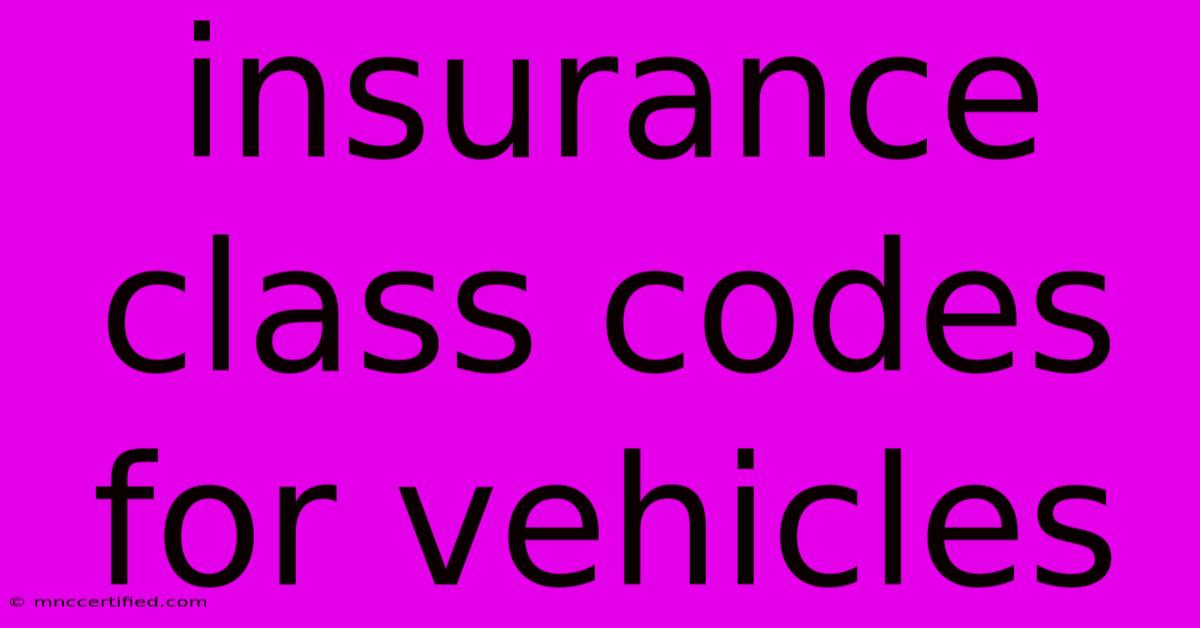Insurance Class Codes For Vehicles

Table of Contents
Decoding the Mystery: Understanding Insurance Class Codes for Vehicles
Choosing the right car insurance can feel like navigating a maze. One crucial, yet often overlooked, element is the insurance class code. This seemingly cryptic number significantly impacts your premium. Understanding these codes is key to securing the best possible rate for your vehicle. This comprehensive guide will demystify insurance class codes, explaining what they are, how they're determined, and how they affect your insurance costs.
What are Insurance Class Codes?
Insurance class codes are numerical identifiers assigned to vehicles by insurance companies. These codes categorize vehicles based on a variety of factors, allowing insurers to assess the relative risk associated with insuring each type of car. Think of them as a shorthand for a complex risk assessment. A higher class code generally indicates a higher risk, translating to higher premiums. Conversely, a lower code suggests a lower risk and potentially lower premiums.
Factors Determining Insurance Class Codes
Several factors contribute to a vehicle's insurance class code. These include:
- Vehicle Make and Model: Certain makes and models have a history of higher repair costs, more frequent accidents, or higher theft rates. Luxury cars, sports cars, and vehicles with a reputation for mechanical issues often fall into higher class codes.
- Vehicle Age: Older vehicles, especially those nearing the end of their lifespan, typically have higher class codes due to increased maintenance needs and a higher likelihood of mechanical failure.
- Safety Features: Vehicles equipped with advanced safety features like anti-lock brakes (ABS), electronic stability control (ESC), and airbags usually receive lower class codes, reflecting their reduced risk profile.
- Engine Size and Power: High-performance engines with significant horsepower often correlate with higher class codes because they can be involved in more serious accidents.
- Vehicle Use: The primary use of the vehicle (personal, commercial) also plays a role. Commercial vehicles often fall into higher class codes due to increased exposure to accidents.
- Repair Costs: The cost of parts and labor to repair a particular make and model is a significant factor. Cars with expensive parts and complex repairs usually result in higher class codes.
How Insurance Class Codes Affect Your Premiums
The insurance class code directly impacts your premium calculation. A higher class code means the insurance company perceives a greater risk of insuring your vehicle, leading to:
- Higher Premiums: You'll likely pay more for your insurance coverage.
- Higher Deductibles: In some cases, insurers may require higher deductibles for vehicles with higher class codes.
Finding Your Vehicle's Insurance Class Code
Unfortunately, there isn't a single, publicly accessible database listing every vehicle's insurance class code. The codes are proprietary to each insurance company. However, you can usually find this information:
- Your Insurance Policy: Your existing policy documents should list your vehicle's assigned class code.
- Your Insurance Provider: Contact your insurance agent or company directly to inquire about your vehicle's class code.
- Vehicle Identification Number (VIN): Some online tools may allow you to input your VIN to estimate your vehicle's potential insurance class, but this is not always accurate across all insurance providers.
Tips for Lowering Your Insurance Premiums
While you can't change your vehicle's inherent class code, you can still take steps to lower your overall insurance premiums:
- Improve your driving record: Maintaining a clean driving record significantly reduces your risk profile.
- Bundle your insurance: Combining multiple insurance policies (home, auto) with the same provider often results in discounts.
- Shop around: Comparing quotes from multiple insurance companies is crucial to finding the best rates.
- Increase your deductible: Opting for a higher deductible can lower your premium.
Conclusion
Understanding insurance class codes is a significant step towards making informed decisions about your car insurance. By understanding the factors that influence these codes and taking proactive steps to manage your risk, you can significantly impact the cost of your car insurance. Remember, comparing quotes and communicating with your insurance provider are essential for securing the best possible coverage at the most competitive price. Don't hesitate to ask questions – your insurance agent is there to help you navigate this process.

Thank you for visiting our website wich cover about Insurance Class Codes For Vehicles. We hope the information provided has been useful to you. Feel free to contact us if you have any questions or need further assistance. See you next time and dont miss to bookmark.
Featured Posts
-
Cofinity Health Insurance Michigan
Nov 16, 2024
-
Cheap Dental Implants No Insurance
Nov 16, 2024
-
Dental Insurance Plans In Delaware
Nov 16, 2024
-
Foremost Insurance Company Florida
Nov 16, 2024
-
Borrowed Car Accident No Insurance
Nov 16, 2024